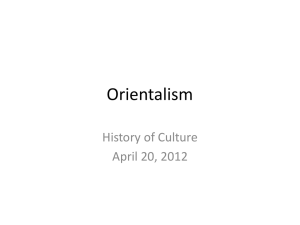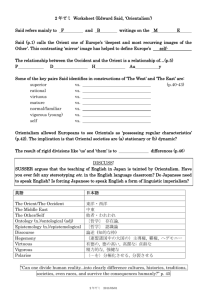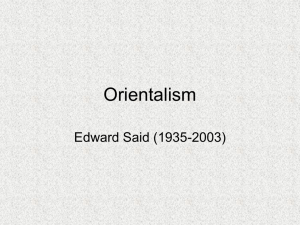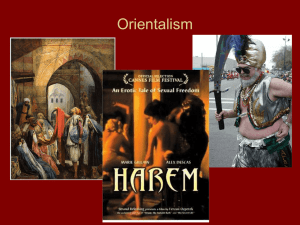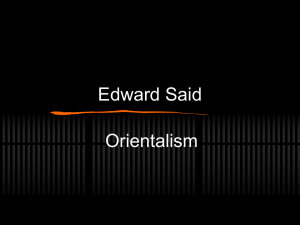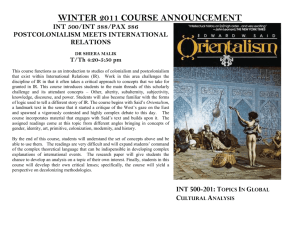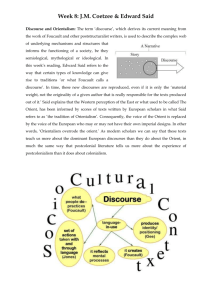Oriental
advertisement
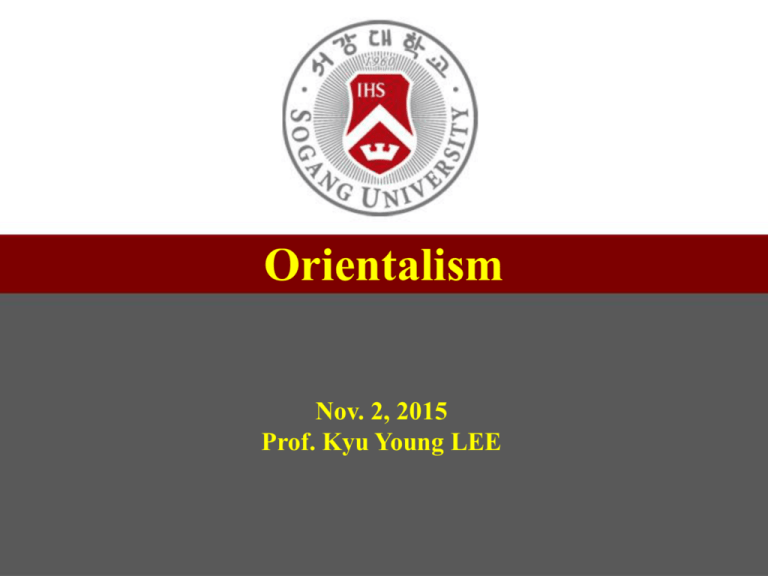
제목
Orientalism
서강대학교 교수학습센터
부소장
Nov. 2,정유성
2015
Prof. Kyu Young LEE
Orientalism (1)
(1) the study of Near and Far Eastern societies and cultures, languages and
peoples by Western scholars.
->the term ‘Orientalism’ :
1) negative connotations in some quarters and
2) interpreted to refer to the study of the East by Americans and Europeans
shaped by the attitudes of the era of European imperialism in the 18th
and 19th centuries.
(2) the imitation or depiction of aspects of Eastern cultures in the West by
writers, designers and artists.
2
Orientalism (2)
* implies old-fashioned and prejudiced outsider interpretations of Eastern
cultures and peoples.
-> This viewpoint was most famously articulated
and propagated by Edward Said
in his controversial book Orientalism (1978)
-> Orientalism was critical of this scholarly
tradition and of modern scholars (including
Princeton University professor Bernard Lewis)
3
Meaning of the term ‘Orientalism’ (1)
* Orientalism <- a Latin word Oriens :
-> the rising of the sun/ to imply "the East" in a relative sense.
-> the opposite of the term Occident, which has largely dropped from common
usage.
* In terms of The Old World,
Europe - 'The West' or Occidental
the furthest known Eastern extremity 'The East' or ‘The Orient'.
4
Meaning of the term ‘Orientalism’ (2)
* From at least the time of the Roman Empire until at least the Middle Ages,
‘the Middle East’' - ‘the Orient’
the flourishing cultures of the Far East were little known, just as Europe was
essentially unknown in ‘the Far East.’
* over time,
the common understanding of 'the Orient' has continually shifted East as
Western explorers traveled deeper into Asia.
-> 1) in Biblical times, the Three Wise Men 'from the Orient' were actually
Magi from "The East" (relative to Palestine) meaning 'the Persian Empire'.
5
Meaning of the term ‘Orientalism’ (3)
-> 2) after all period, as Europe gained knowledge of countries further to
the East,
the definition of the limit of 'the Orient' progressively shifted eastwards, until
the Pacific Ocean was reached, in what is also known as 'the Far East'.
-> 3) This can cause some confusion about the historical and geographic
scope of Oriental Studies.
6
Meaning of the term ‘Orientalism’ (4)
* However,
some contexts where ‘the Orient’ or ‘Oriental’ refer to older definitions.
-> for example 1) ‘Oriental Spices’:
regions extending from the Middle East through the Indian sub-continent to
Indo-China.
2) travel on the Orient Express (from Paris to Istanbul):
eastward bound (towards the sunrise), but does not reach what is currently
understood to be the Orient.
7
Meaning of the term ‘Orientalism’ (5)
* in contemporary English,
Oriental :
1) usually a synonym for the peoples, cultures and goods from the parts of
East Asia traditionally occupied by East Asians and Southeast Asians,
excluding Indians, Arabs and other more westerly peoples.
2) in some parts of America it is considered derogatory to use this term to
refer to Asians (whether East, South, West or Central Asians).
for example, in Washington state it is illegal to use the word 'oriental' in
legislation and government documents
8
History of Orientalism (1)
* difficult to be precise about the origin of the distinction between the
“West” and the “East”
-> however, the rise of both Christianity and Islam:
a sharp opposition between European Christendom and the Muslim cultures
to the East and in North Africa.
-> during the Middle Ages,
Islamic peoples: the "alien" enemies of the Christian world.
9
History of Orientalism (2)
* European knowledge of cultures further to the East
- very sketchy.
- a vague awareness that complex civilizations existed in India and China, from
which luxury goods such as woven textiles and ceramics were imported.
- based on European explorations and expanded colonisations, a distinction
emerged between non-literate peoples, for example in Africa and the
Americas, and the literate cultures of the East.
10
History of Orientalism (3)
* in the 18th century
-> Enlightenment thinkers: aspects of Eastern cultures - superior to the
Christian West.
For example Voltaire: Zoroastrianism would support a rational Deism superior
to Christianity.
the relative religious tolerance of Islamic countries in contrast with the
Christian West
the status of scholarship in Mandarin China.
complex connections between the early history of Eastern and Western
cultures with the translation of the Avesta by
Abraham Anquetil-Dupperon and the discovery of the Indo-European
languages by William Jones
11
History of Orientalism (4)
* however, these developments
- occurred in the context of rivalry between France and Britain for control of
India
- associated with attempts to understand colonised cultures in order more
effectively to control them.
For example
1) Liberal economists (James Mill) denigrated Eastern countries on the
grounds that their civilizations were static and corrupt.
2) Karl Marx : the "Asiatic mode of production" as unchanging/ praising of
British colonialism in India.
3) Christian evangelists sought to denigrate Eastern religious traditions as
superstitions (for example Juggernaut).
12
History of Orientalism (5)
* the first serious European studies of Buddism and Hinduism - undertaken by
scholars such as Eugene Burnouf and Max Mueller.
-> in this period serious study of Islam also emerged.
-> by the mid-19th century, Oriental Studies as an established academic
discipline. -> but, often scholarly ideas: intertwined with such prejudicial
racial or religious assumptions.
-> Eastern art and literature: still seen as "exotic" and as inferior to Classical
Graeco-Roman ideals.
-> Their political and economic systems: generally thought to be feudal
"oriental despotisms"/
their alleged cultural inertia: considered to be resistant to progress.
13
Imitations of Oriental styles –
Examples of Orientalism in the arts (1)
Chinese tower in the
English Garden, Munich,
Initial structure built
1789-1790
14
15
16
Imitations of Oriental styles –
Examples of Orientalism in the arts (2)
"Le Bain turc,"
(Turkish Bath) by J.A.
D. Ingres, 1862
17
Imitations of Oriental styles –
Examples of Orientalism in the arts (3)
Cover of the French
magazine
le Japon artistique
(May 1888) showing
one of Hokusai's views
on Mount Fuji.
18
Edward Said and ‘Orientalism’ (1)
* the word "Orientalism" carried no overt negative freight.
* "Oriental":
-> simply understood as the opposite of “occidental" ('western')
-> used to develop negative connotations following the publication of the
groundbreaking work Orientalism by the American-Palestinian scholar Edward
Said.
19
Edward Said and ‘Orientalism’ (2)
* Edward Said
-> 1) emphasized the relationship between power and knowledge in
scholarly and popular thinking, in particular regarding European views of
the Islamic Arab world.
-> 2) argued that Orient and Occident worked as oppositional terms, so
that the "Orient" was constructed as a negative inversion of Western
culture.
-> 3) sought to lay bare the relations of power between the colonizer and
the colonized in those texts.
20
Edward Said and ‘Orientalism’ (3)
-> 4) Said's writings have had far-reaching implications beyond area studies
in Middle East, to studies of imperialist Western attitudes to India, China
and elsewhere. It was one of the foundational texts of postcolonial
studies.
-> 5) later developed and modified his ideas in his book Culture and
Imperialism (1993)
21
